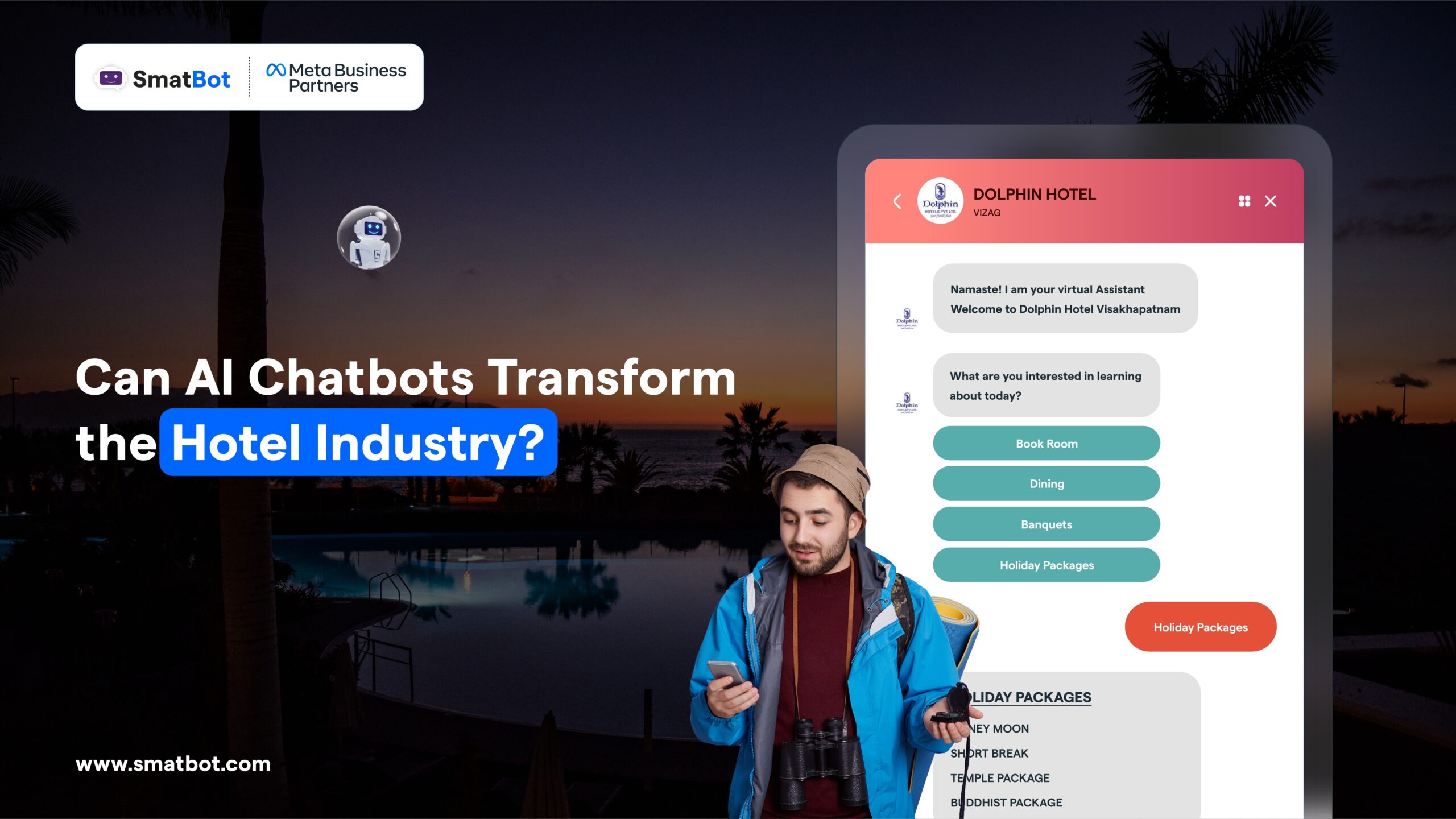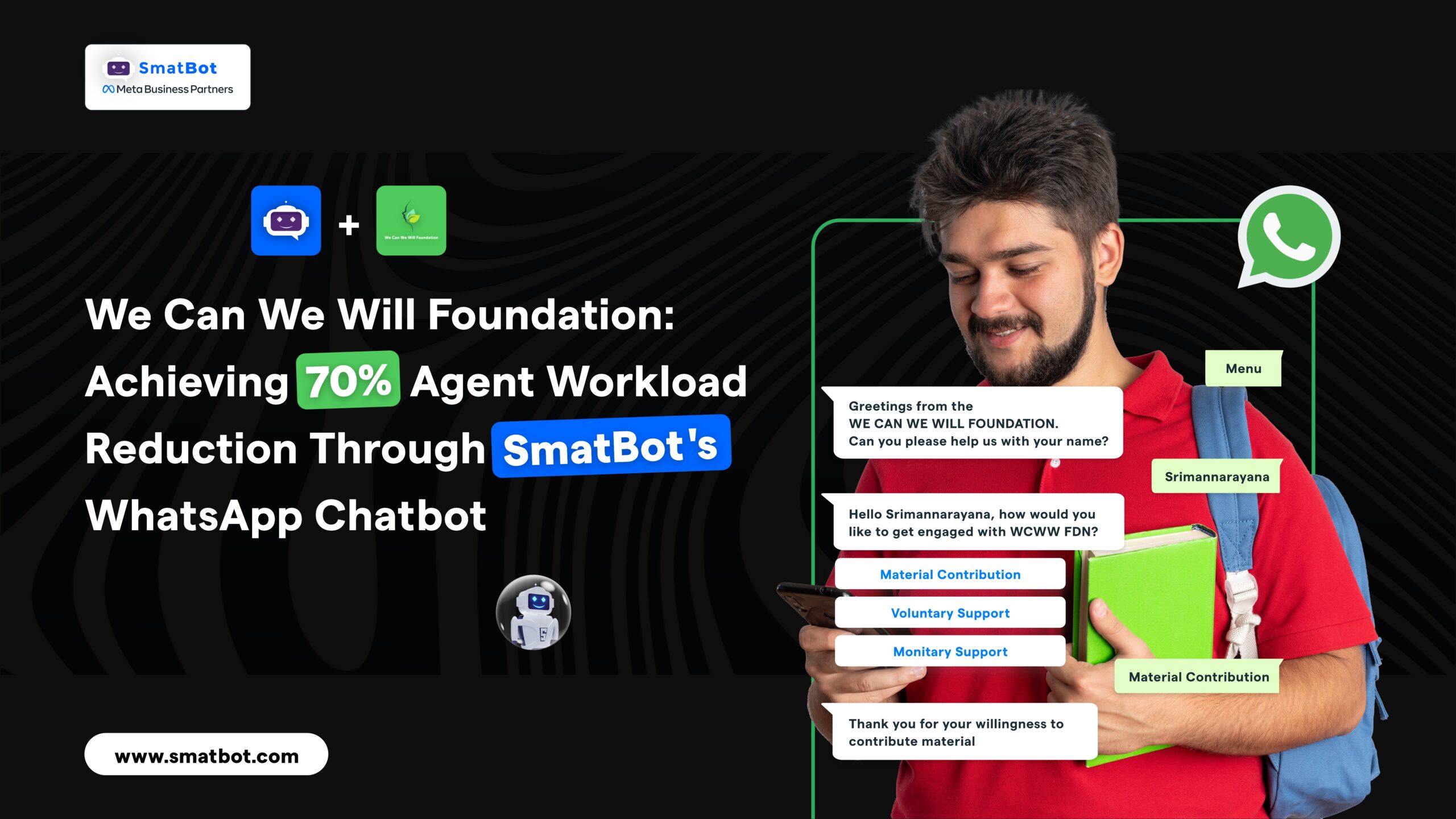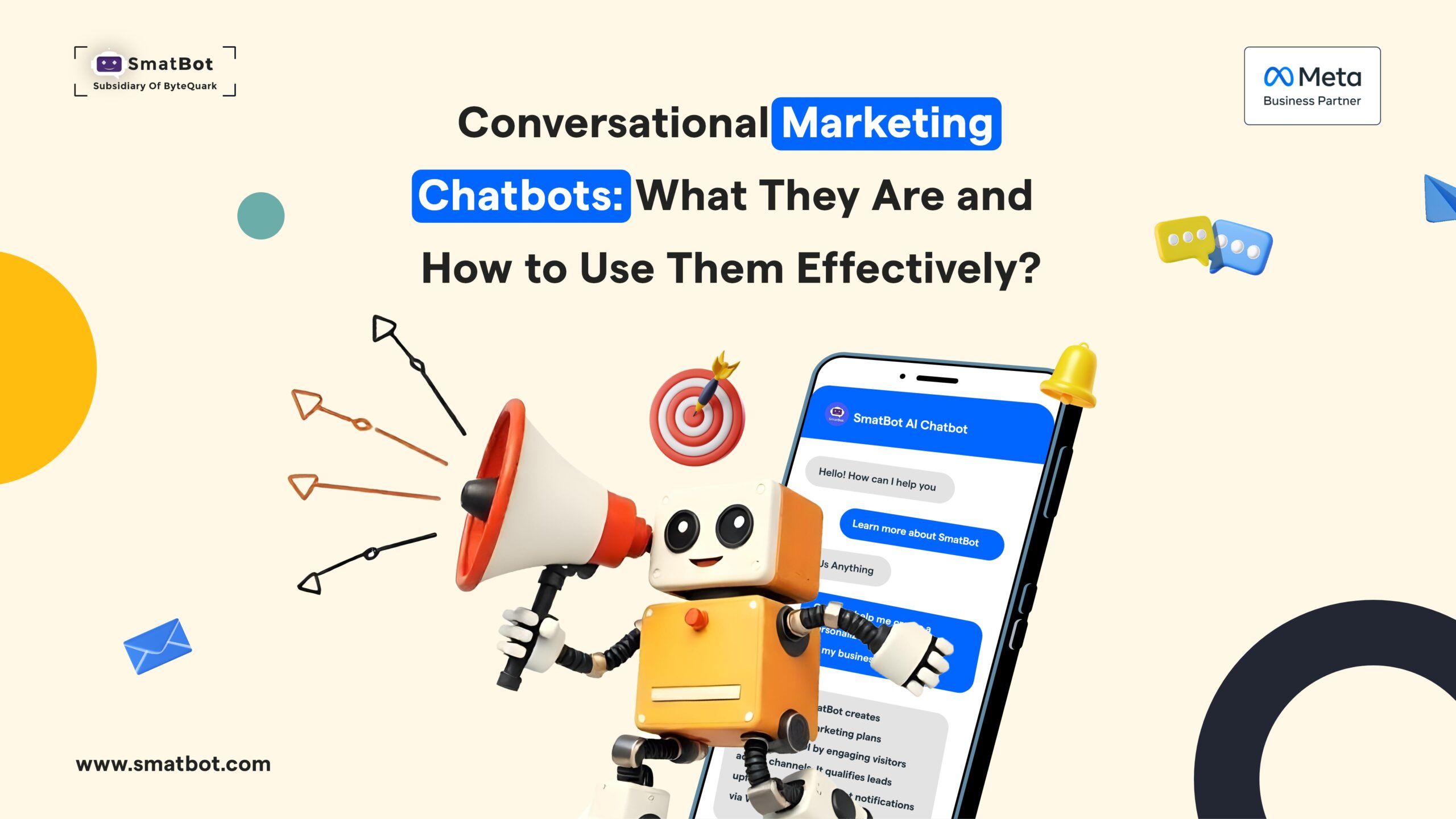Conversational Enterprise: Everything CXOs Need To Know
Conversational enterprises are the ones who are moving like wildfire towards using technology for meeting their business needs.
The reason is that-enterprises are overloaded with challenges such as-
- Less time to reply,
- Customer demands & expectations,
- Low ROI,
- Decreased consumer loyalty,
- Increased production costs, and many more.
The primary challenge here is to maintain a competitive edge ahead of digital advancement.
Omni-channel solutions coupled with personalized, multi-mode engagement features on conversational AI platforms will increase customer satisfaction, retention, engagement, and loyalty.
Conversational enterprise is something a must to know the topic for every enterprise that aims to advance in the future.
As per the research conducted for conversational AI, its market size can grow from $4.2 billion in 2019 to $15.7 billion by 2024, reaching a CAGR of 30.2%, which is more than the NLP market in general.
Stay tuned to this article; here we are, covering conversational enterprise all the way.
- What is Conversational Enterprise?
- How Can Conversational AI Improve Their Customer Experience?
- How Can You Kickstart As a Conversational Enterprise?
- What Are the Vital Factors to Focus on While Deploying Conversational AI?
- What Are the Roadblocks to Become a Conversational Enterprise?
- What is the Future of Conversational Enterprise?
Let’s begin!
What is Conversational Enterprise?
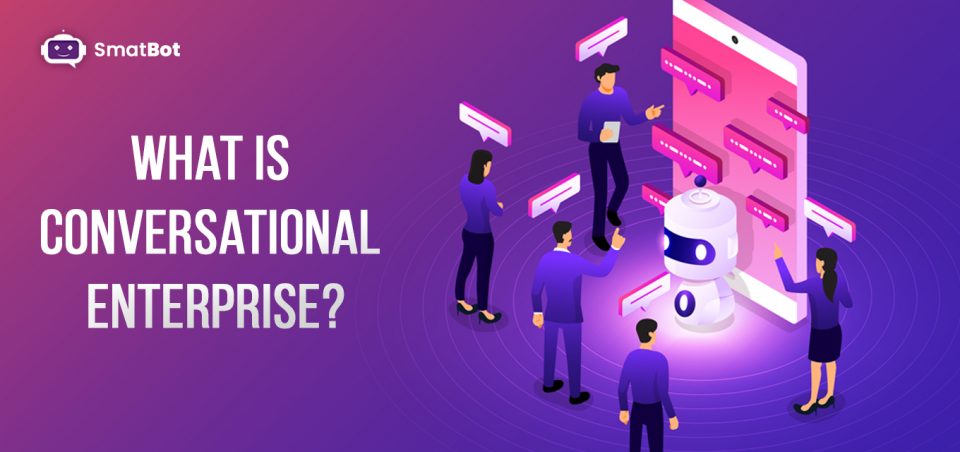
A conversational enterprise is a firm that integrates conversational AI into its overall workflows. Most probably, they deploy various types of advanced solutions available such as-
- Conversational AI Advisory
- Creating virtual agents/chatbots
- Transformation of contact centers
- Use of multi-modal engagement
- Deployment of conversational analytics
- Conversational knowledge management
Using chatbots is probably the standard solution enterprises adopt to interact directly with their customer and give an instant solution for their queries. Besides these, Chatbots have answers to many business problems directly or indirectly. Learn more about chatbot benefits here.
Becoming a Conversational enterprise will help the company gain a competitive edge in these-customer-centric, updated dynamic technology advancements, meet visions, and operational efficiency.
Conversational enterprise is a must-know topic for CMOs, CEOS, CSOs, CDOs, and other senior-level heads to give fire to their forward-thinking and look at the opportunities that take their business to the new level in a highly challenging environment.
Let’s take deep insights into-
How Can Conversational AI Improve Their Customer Experience?
Conversational enterprise is not a simple buzzword that shows company adoption to advancement. It needs a lot of effort, steps, understanding to adopt dynamic changes and act accordingly in a highly advanced environment.
Conversational AI is the way companies are adapting to meet their needs. Conversational AI is not the only thing that makes it happen; companies are also exploring new technologies for better customer service.
Consider an example:
During a chat process, bots, after understanding the users’ emotional state, will automatically switch it to the human agent for resolution of queries. In this whole process, switching of chat from bot to human all happens based on customer reactions/emotions.
Even brands use their customer’s data acquired from various first, second, and third party sources to get deeper insights of customers and, in turn, combined with AI to deliver better customer service.
These insights also help the businesses update their products or services, which are more appealing and customized to their customers—and helping the customers deliver relevant ads on their preferred channels.
Improving the Functioning of Ongoing Analytics With Neural Nets
Conversational AI even proved to be very useful in an organization with rich data sources and integrates human interactions because it creates a conversational neural mesh around the organization.
In the healthcare, finance, telecommunications, retail, and media industries, rich data can experience a massive development in analytics capabilities by deploying conversational AI.
Consider an example:
In banking, using financial details of the customers; they can easily understand financial stability, credit score and other information based on what it can suggest for loans, products or services, enrolling suggestions for LIC, mutual funds, and many other financial schemes.
With Conversational AI, the sky’s the limit for the businesses when combined with various technologies.
How Can You Kickstart As a Conversational Enterprise?
The number of industries converting towards a conversational enterprise is growing at a good rate. Business leaders are also noticing the conversational enterprise experienced benefits. However, becoming a conversational enterprise needs an added support or outsourcing for some costly capabilities and infrastructure to experts.
So how can you start with this?
The best way is first to analyze your business’s capabilities and determine- where your business is lagging. What changes can improve your business further and other questions? When you have clear answers and solutions for this, you can easily get to know where you stand to become a conversational enterprise. If you are lagging at some points, you can develop and make ready your business for the future.
Let’s understand them in more detail from these points:
What Are the Key Factors to Consider to Deploy Conversational AI?
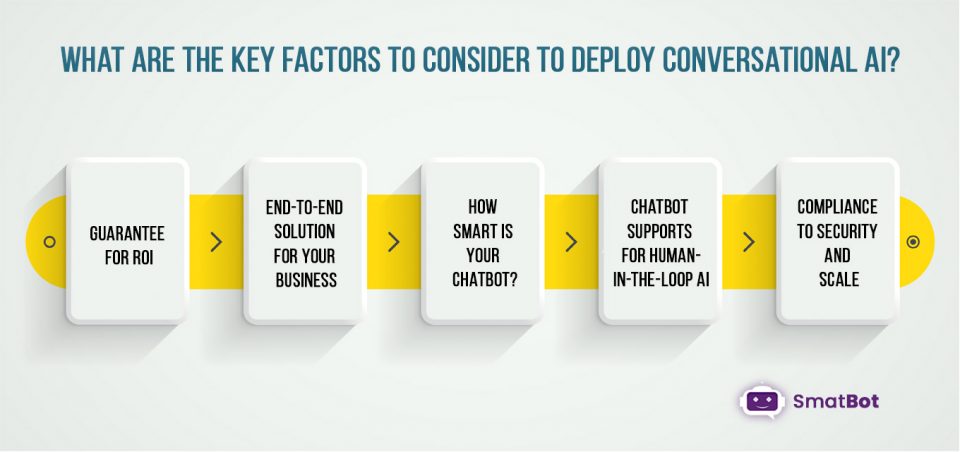
The benefits of conversational AI are dragging the enterprises’ attention to use conversational AI chatbots in their business. Conversational AI chatbots will help companies enhance customer satisfaction, bring more sales, and many more benefits.
- Guarantee for ROI
First, define your vital key performance indicators (KPIs), which determine your ROI, then look for how it can help you achieve that in the long-run and achieve current goals.
- Your KPI list could be anything like-
- Automating business operations,
- Gaining sales through omnichannel experience,
- And any other.
Determine the various use cases for your businesses and check how you can achieve with the chatbots. Most probably, chatbots can answer first-tier questions and leave complex issues to humans. Chatbots can prevent you from answering all repetitive tasks.
- End-to-End Solution for Your Business
The chatbot you’re deploying must provide a solution at every stage of the customer journey. Most of the brands deploy chatbots for a particular channel; having omnichannel coverage will help the business cover its overall experience. Also, consider its features, how suitable it is for your business? How user-friendly are their dashboards? Easy set-up, and other things.
- How Smart is Your Chatbot?
If the chatbot supports all these, you can go as it helps you save a considerable cost and time on these.
A chatbot can come in multi-languages. It should understand the emotions, sentiments, and intent of the approach,. If your chatbot can realize all these, it’s enough for you to meet your customer satisfaction. Here is what you should look at:
- Context-aware dialog management
- Sentiment analysis for positive emotive experiences
- Dynamic text to speech
- Fluently handling out of scope queries.
- Machine learning(Natural Language Processing)
- Voice optimized responses
- Text-aware dialog management
- Sentiment analysis for positive emotive experiences
- Fluently handling out of scope queries.
- Chatbot Supports for Human-In-The-Loop AI
Conversational agents can solve 80% of the customer queries, and at some moment, we need a human touch. You need to check for the chatbot who can transfer it automatically, also look at whether the chatbot can transfer the request to respective departments rightly and provide the right support to the human-agent. Is it taking quick actions to provide information?
Chatbots must not disrupt the normal flow of conversation and waste too much time for the customer. Also, look for the continuous flow of conversation without repeating the same, because it creates terrible impressions on customers.
- Compliance to Security and Scale
Security plays a critical role in handling sensitive information of customers and transaction details that the chatbots need to address.
You must check whether the chatbot adheres to consumer security & privacy laws such as- GDPR, HIPAA, etc. It’s considered the primary factor to choose chatbot and other security measures such as- encryption authentication and authorization measures.
All the sensitive and confidential data must be stored and handled from all system interactions throughout various levels.
What Are the Roadblocks to Become a Conversational Enterprise?
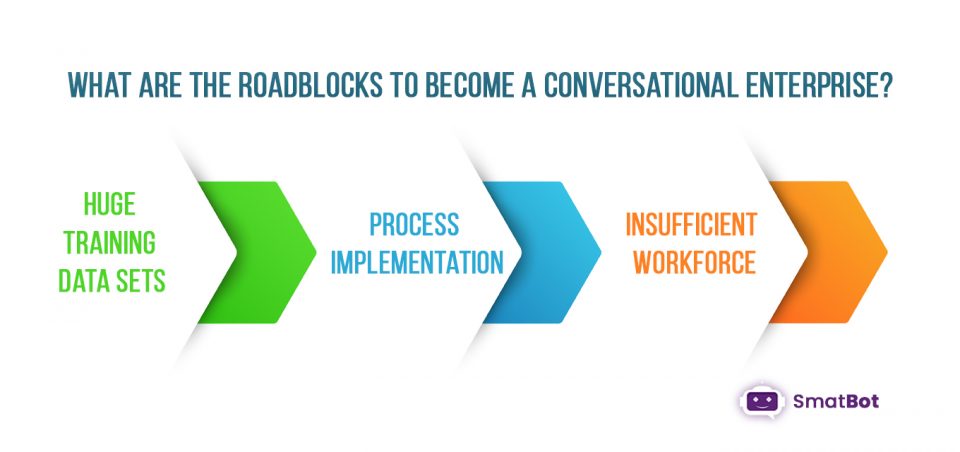
To become a Conversational enterprise, even well-structured organizations also may face challenges in some or other ways. Here we have listed some of the most common challenges we see among leaders struggling with:
Huge Training Data Sets
Generally, companies have a large amount of unstructured data. Most of the content is redundant for the companies, and extracting the useful information from that large bunch of data requires a proper plan, software, tools, and actions.
Some of the points to consider here includes-
- Data obtain technique
- Storing data in a secure way
- Taking consent from individuals before collecting data
- Customers consent to Share information from third-parties or with partners
Process Implementation
Chatbots must be able to get insights from the previous interactions and learn from them and act accordingly. That can help the enterprise in smooth-flow operations and data management processes.
Insufficient Workforce
Conversational enterprise needs highly qualified professionals to take decisions at every point of business cycles. It often involves improving and handling the deep neural network. Currently, organizations are facing shortcomings for these professionals.
What is The Future of Conversational Enterprise?
Anyhow conversational AI needs to be adopted by the organization now or in the near future. As conversational AI became the next wave of customer and employee relations.
The critical part to consider here is to create the right plan to become a conversational enterprise.
Adobe Survey determined that 31% of top-performing businesses plan to deploy AI within the upcoming year, irrespective of industry or country.
Here based on the points discussed above, we can say that becoming a conversational enterprise is not so easy. There are a lot more things to consider while building, maintaining, and improving. You need the right software system and qualified professionals to take the initiative at every step.
Experts can help you with this; we SmatBot team can help you understand your business and help you in taking a step towards deploying a conversational AI chatbot for your business.
Want to know more? Our team is glad to assist you.


